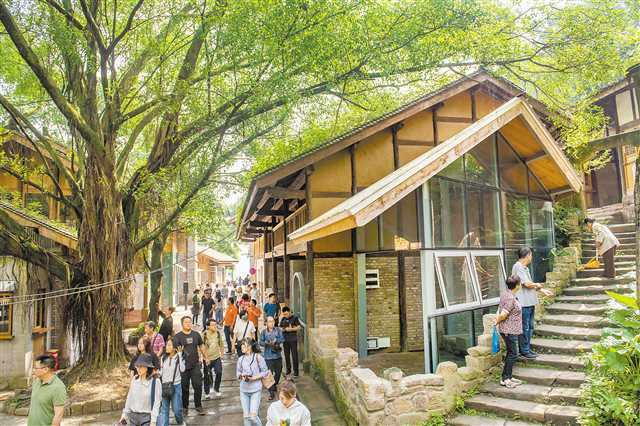Chongqing News
Jingangbei takes you on a storytelling journey of years in Chongqing
2024-02-08 14:07:59

CHONGQING (CQNEWS) -- The newly-opened souvenir store in Jingangbei, an ancient village of hot springs in Beibei, offering various wonderful Jingangbei souvenirs like miniature Jingang Buddha replicas and exquisite shopping bags with cartoon characters printed on them, has become a magnet for visitors.
Located at the foot of Jinyun Mountain by the Jialing River, the 300-year-old Jingangbei Ancient Village is endowed with natural hot springs. During the Counter-Japanese War, the national government moved to Chongqing in southwest China, as a result of which a large number of industrialists, historians, and writers settled in Jingangbei, bringing unprecedented prosperity to Jingangbei and shaping its culture.
Today, the newly renovated Jingangbei Wenquan has been opened to the public, offering an insight into the ancient buildings designed in an eastern Sichuan style and the long history of Chongqing.
Each building, each tree, and even each stone slab is the object of repair and protection, said the Beibei Urban-rural Development Commission. In 2018, Beibei launched a project to restore the historical and cultural block in the Jingangbei ancient village as much as possible. As part of the efforts to maintain the original appearance of the ancient town, termite prevention, and control measures were taken to save the old trees infested with termites in the ancient village. Today, these old trees are free from termite infestation and full of vigor.
Jiaoyuan Teahouse, one of the famous scenic spots in Jingangbei ancient village, is of primitive simplicity, decorated with green bricks, small tiles, exquisite lintels, and banana leaves. The tea house was formerly the dwelling place of Weng Wenhao, the first doctor of geology in China. During the Counter-Japanese War, Mr. Weng moved with his family to the Jingangbei ancient village, where he finished his book of poetry ‘Jiaoyuan Poetry’. That’s why the tea house is named ‘Jiaoyuan’.
Many students studying Fine Arts at Southwest University practice sketching in Jiaoyuan Teahouse every weekend and holiday, saying that the fine view of the Jialing River and quaint courtyards in the balcony of the teahouse inspires their creation.
The resumption of Jiaoyuan Teahouse demonstrates Beibei’s efforts to bring to life the ancient streets and buildings in Jingangbei. Multi-family residential complexes such as the Yao family and the He family were formed in Jingangbei during the Anti-Japanese War. Today, Beibei has taken measures to protect and repair more than 100 ancient buildings in Jingangbei and introduced new forms of business to promote the integrated development of culture and economy.
Relying on hot springs and other resources, Jingangbei will launch more fun and interactive consumption activities to cultivate new forms of business and renew the century-old streets.
Tips for visiting the Jingangbei ancient village >>>
Public transportation: Take CRT Line 6 to Beibei Station, take a three-minute walk from Exit 4B to Wulukou Bus Stop, and then take Bus 518 or 520 to Jingangbei Bus Stop.
Self-drive tip: Search ‘Jingangbei Riverside Entrance Parking Lot’ or ‘Jingangbei National Highway Entrance Parking Lot’ on your digital map. (Translated by Yuki, Fathom Language Limited)
Editor:Jiang Yiwei
 手机阅读分享话题
手机阅读分享话题